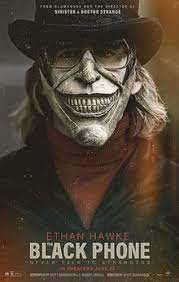The Black Phone Review
The Black Phone is described as a 2021 American coming-of-age/supernatural/horror film adapted by director Scott Derrickson and directed by both Derrickson and C. Robert Cargill. Released in the United States by Universal Pictures on June 24, 2022 the film set in a Denver Suburb 1978 exhibits the town lore of a masked serial killer, nicknamed “The Grabber” and played by Ethan Hawke, who continuously snatches young boys from off the streets. The movie follows a young boy named Finney Blake, played by Manson Thames, along with his sister Gwen Blake, played by Madeleine McGraw, introducing us to their lives through their alcoholic fathers abuse. The two siblings’ luck goes further south as they are forced to witness the increasing kidnappings of kids in their town.
Content Warning! Spoilers will now be discussed in this review!
The film goes as stated, Siblings Finney Blake and Gwen Blake, already bullied in school and tormented by their single Alcoholic father, already live a sour life. But fate takes a turn as the kidnappings of kids in their town inch closer to their lives until Finney’s only good friend, Robin, is stolen by “The Grabber ”. Gwen Blake is plagued with supernatural dreams and has learned facts about the kidnappings through them. Finney begs his sister to use her dreams to find and save Robin, but before anything could be done Finney Blake becomes The Grabbers new victim. The rest of the movie consists of Finney attempting to escape The Grabber, communicating with the ghosts of The Grabbers past victims while they advise Finney.
Rather than continuing to an unsatisfying and entirely uncomfortable ending the directors pull out this youthful approach, presenting the lecturing idea of fighting against pain and traumas. The incorporated theme of battling personal life pains in a coming-of-age horror film can be related to Stephen King’s It film. Similar to that off It, the horror movie, the children battling Pennywise using their bravery carries a similar lesson in The Black Phone, when Robin tells Finny he needed to finally stand up for himself now against ‘The Grabber’, it radiates the ‘coming-of-age’ portation of the movies genre. This similarity in writing between Stephen King’s work and this film made Derrickson and C. Robert Cargill connected through the fact that the original short film before The Black Phone’s adaptation was written by Stephen king’s son, Joe Hill. The subplot of supernaturality was prevalent and important to the story although not incredibly elaborated on, to some it may seem overexaggerated but the progression of the story’s supernatural activity didn’t make the supernatural aspects seem cringey or random.
In terms of Cinematography and Videography the filmmaking was certainly the makings of perfection. Any reactions of discomfort or disgust to scenes and shots of the film were professionally implied and purposeful with the intention of portraying mood and characterization. The pacing of the storyline was well enough to keep viewers intrigued and timed to leave viewers without confusion or dissatisfaction.
The hopeful aura in Finney’s escape didn’t taint the filmmakers skill for perfectly projecting the tense and skittish themes in the movie. Directors Scott Derrickson and C. Robert Cargill kept the story’s horror factors perfectly illustrated enough to create unrest in the viewers and create anxiousness in anticipation for certain scenes’ consequences.
Overall a well produced and captured movie, full of incredible performances by Its actors, with a high recommendation rate and well progressed story of horror/coming-of-age film.
